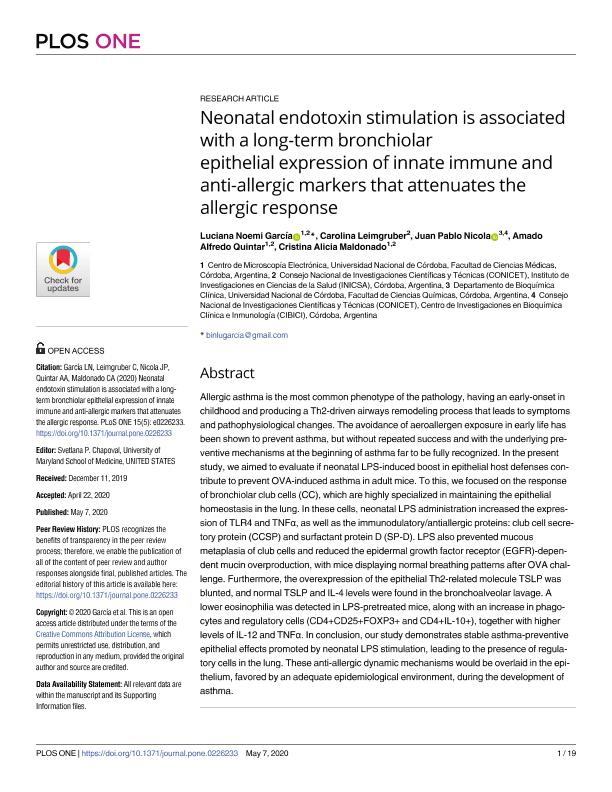Mostrar el registro sencillo del ítem
dc.contributor.author
García, Luciana Noemí

dc.contributor.author
Leimgruber, Carolina

dc.contributor.author
Nicola, Juan Pablo

dc.contributor.author
Quintar, Amado Alfredo

dc.contributor.author
Maldonado, Cristina Alicia

dc.date.available
2022-06-01T17:51:51Z
dc.date.issued
2020-05
dc.identifier.citation
García, Luciana Noemí; Leimgruber, Carolina; Nicola, Juan Pablo; Quintar, Amado Alfredo; Maldonado, Cristina Alicia; Neonatal endotoxin stimulation is associated with a long-term bronchiolar epithelial expression of innate immune and anti-allergic markers that attenuates the allergic response; Public Library of Science; Plos One; 15; 5; 5-2020; 1-19
dc.identifier.uri
http://hdl.handle.net/11336/158680
dc.description.abstract
Allergic asthma is the most common phenotype of the pathology, having an early-onset in childhood and producing a Th2-driven airways remodeling process that leads to symptoms and pathophysiological changes. The avoidance of aeroallergen exposure in early life has been shown to prevent asthma, but without repeated success and with the underlying preventive mechanisms at the beginning of asthma far to be fully recognized. In the present study, we aimed to evaluate if neonatal LPS-induced boost in epithelial host defenses contribute to prevent OVA-induced asthma in adult mice. To this, we focused on the response of bronchiolar club cells (CC), which are highly specialized in maintaining the epithelial homeostasis in the lung. In these cells, neonatal LPS administration increased the expression of TLR4 and TNFα, as well as the immunodulatory/antiallergic proteins: club cell secretory protein (CCSP) and surfactant protein D (SP-D). LPS also prevented mucous metaplasia of club cells and reduced the epidermal growth factor receptor (EGFR)-dependent mucin overproduction, with mice displaying normal breathing patterns after OVA challenge. Furthermore, the overexpression of the epithelial Th2-related molecule TSLP was blunted, and normal TSLP and IL-4 levels were found in the bronchoalveolar lavage. A lower eosinophilia was detected in LPS-pretreated mice, along with an increase in phagocytes and regulatory cells (CD4+CD25+FOXP3+ and CD4+IL-10+), together with higher levels of IL-12 and TNFα. In conclusion, our study demonstrates stable asthma-preventive epithelial effects promoted by neonatal LPS stimulation, leading to the presence of regulatory cells in the lung. These anti-allergic dynamic mechanisms would be overlaid in the epithelium, favored by an adequate epidemiological environment, during the development of asthma.
dc.format
application/pdf
dc.language.iso
eng
dc.publisher
Public Library of Science

dc.rights
info:eu-repo/semantics/openAccess
dc.rights.uri
https://creativecommons.org/licenses/by-nc-sa/2.5/ar/
dc.subject
ALLERGIC ASTHMA
dc.subject
BRONCHIOLAR CLUB CELLS
dc.subject
LIPOPOLYSACCHARIDE
dc.subject
EPITHELIAL HOST DEFENSE
dc.subject.classification
Bioquímica y Biología Molecular

dc.subject.classification
Medicina Básica

dc.subject.classification
CIENCIAS MÉDICAS Y DE LA SALUD

dc.title
Neonatal endotoxin stimulation is associated with a long-term bronchiolar epithelial expression of innate immune and anti-allergic markers that attenuates the allergic response
dc.type
info:eu-repo/semantics/article
dc.type
info:ar-repo/semantics/artículo
dc.type
info:eu-repo/semantics/publishedVersion
dc.date.updated
2021-09-06T15:15:06Z
dc.identifier.eissn
1932-6203
dc.journal.volume
15
dc.journal.number
5
dc.journal.pagination
1-19
dc.journal.pais
Estados Unidos

dc.journal.ciudad
San Francisco
dc.description.fil
Fil: García, Luciana Noemí. Consejo Nacional de Investigaciones Científicas y Técnicas. Centro Científico Tecnológico Conicet - Córdoba. Instituto de Investigaciones en Ciencias de la Salud. Universidad Nacional de Córdoba. Instituto de Investigaciones en Ciencias de la Salud; Argentina. Centro de Investigación de la Fundación Repro; Argentina
dc.description.fil
Fil: Leimgruber, Carolina. Consejo Nacional de Investigaciones Científicas y Técnicas. Centro Científico Tecnológico Conicet - Córdoba. Instituto de Investigaciones en Ciencias de la Salud. Universidad Nacional de Córdoba. Instituto de Investigaciones en Ciencias de la Salud; Argentina
dc.description.fil
Fil: Nicola, Juan Pablo. Consejo Nacional de Investigaciones Científicas y Técnicas. Centro Científico Tecnológico Córdoba. Centro de Investigaciones en Bioquímica Clínica e Inmunología; Argentina
dc.description.fil
Fil: Quintar, Amado Alfredo. Consejo Nacional de Investigaciones Científicas y Técnicas. Centro Científico Tecnológico Conicet - Córdoba. Instituto de Investigaciones en Ciencias de la Salud. Universidad Nacional de Córdoba. Instituto de Investigaciones en Ciencias de la Salud; Argentina
dc.description.fil
Fil: Maldonado, Cristina Alicia. Consejo Nacional de Investigaciones Científicas y Técnicas. Centro Científico Tecnológico Conicet - Córdoba. Instituto de Investigaciones en Ciencias de la Salud. Universidad Nacional de Córdoba. Instituto de Investigaciones en Ciencias de la Salud; Argentina
dc.journal.title
Plos One

dc.relation.alternativeid
info:eu-repo/semantics/altIdentifier/doi/http://dx.doi.org/10.1371/journal.pone.0226233
dc.relation.alternativeid
info:eu-repo/semantics/altIdentifier/url/https://journals.plos.org/plosone/article?id=10.1371/journal.pone.0226233
Archivos asociados
